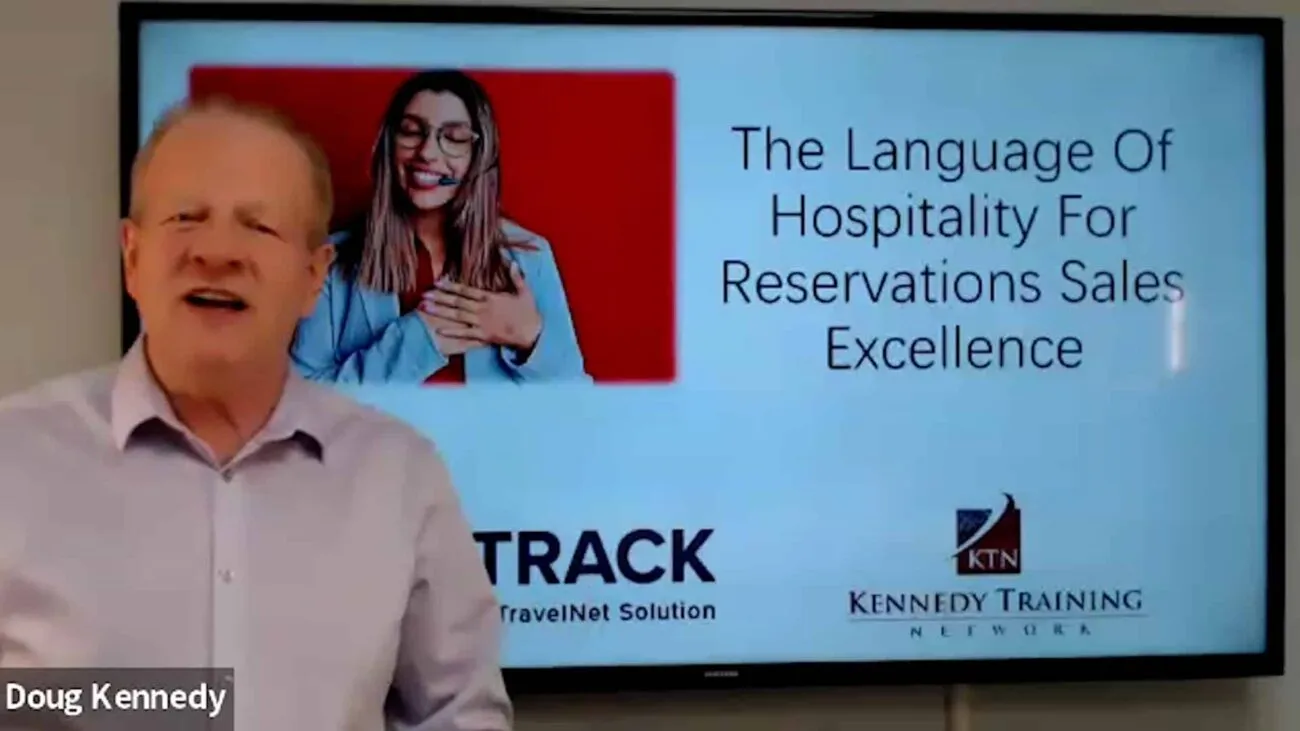The Language of Hospitality: Reservations Sales Edition

I believe most of us would agree that interpersonal communications is always a challenge, especially for anyone that is married, engaged, or who has a domestic partner, significant other, boyfriend, girlfriend, parent, child, siblings or roommates! (In other words, basically anyone you live with other than a dog, because we all know that dogs are great listeners and never judge.)
In the hospitality industry, language can be even more challenging because we are by nature selling an “product” on which the satisfaction is based on the emotional state of the guest we are interacting with. That’s why, in all of our KTN workshops, we include examples of phrases that are often said by staff to guests, along with alternatives that evoke the spirit of hospitality. In my recent webcast for Track Hospitality Software, I shared such examples which focused on reservations conversations our teams are having on the phone and also by way of textual exchanges. Here is a recap. Of course more details and examples are included in the webcast replay below.
Examples Relating To Hospitality
I’ll have to check on that for you … vs. Allow me to check on that.
- The first example makes it sound like the guest is imposing on our time. We might as well say “If it wasn’t for all you guests interrupting us, we could get so much more done here.”
I’m only just a reservations agent. You’ll have to call. vs. We have a special team to handle requests such as these. Allow me to transfer you.
- The first example diminishes our value and makes us sound like we have limited role, whereas the alternative presents having specialized colleagues as an advantage.
You’ll have to… vs. May I suggest that you…
- The first example may feel to some guests as if we are ordering them around, where as the second sounds more polite and helpful.
I don’t think so… or I’m pretty sure… vs. It is… It isn’t… or I’ll find out and let you know.
- If a guest is calling or sending a question via textual exchanges, chances are they have already checked online and really want a definitive answer. Be prepared to answer frequently asked questions and when you don’t know, there’s nothing wrong with indicating you will research it for them.
(In response to the question: “I never got my check-in instructions…”) You need to check your spam folder… vs. I would be happy to re-send those now while you stay on the line. Sometimes our emails get sent to spam folders.
- The first example places the blame on them, whereas the alternative offers the most important part, an immediate solution, while still explaining the problem.
This happens all the time! vs. I apologize that you’ve experienced this issue.
- Sure, the problem or issue the guest is encountering may in fact happen frequently due to a temporary operational issue or system glitch, but we do not need to let the guest know this!
Examples Relating To Policies and Procedures
Sorry, that’s against our policy. vs. Let me check further… (followed by a brief pause or hold, then) In checking further, as it turns out…
- If you do think it is possible to get approval for a workaround, or if your manager has empowered you to have reasonable flexibility, then you really may need to check further. Otherwise, sometimes even providing a pause to “check further” (wink, wink!) alone shows good will. Then by starting with “As it turns out…” softens the bad news of a final “no.”
- When you have to say no, it may be helpful to explain that the policy is out of concern for guest safety or security.
I’m not showing that request. Who did you speak with? vs. Let me see what we can work out for you, and I certainly apologize for the misunderstanding.
- Depending on the tone of voice, the first example could sound as if we are doubting that the guest actually heard that, whereas the second alternative moves on to finding a workable solution.
We can’t guarantee that. (Location, early check-in, view, connecting rooms…) vs. What I can do is… or What we do have available is…
- The alternative places the focus on alternatives versus limitations. Most guests will understand more than we can be assured of delivering for them; there are reasons for which we cannot guarantee…
Examples Relating To Rates, Restrictions And Availability
We don’t offer that rate. vs. May I ask what website you’re on?
- The alternative flushes out the possible real issues. Are they logged-in as an Expedia member and therefore seeing rates that deduct their Expedia loyalty credits? Are they looking at the website of a random third-party tour operator who they will actually be booking with at their own risk? It then moves the conversation towards the best solution we can offer, which is to book them directly, right now, saving them time and providing other advantages.
Do you qualify for any discounts such as AAA, AARP, or Military? or, Does your company or group have a special rate? vs. Say nothing; it is the buyers job to ask for a discount!
- While we do want to ask if guests qualify for discounts after they have voiced a rate objection, do not routinely offer or mention discounts at the start of conversations.
You can’t get that rate for those dates! It says so in the fine print next to the asterisk. vs. Our rates are date sensitive. Are your plans flexible? May I check other dates?
- The alternatives moves the conversation towards a solution.
That discount only applies to our BAR rates. vs. The rates I have quoted our lowest available rates for your dates.
- Many hotels refer to their “regular” rate as BAR (best available rate), yet this industry acronym may baffle some guests.
That rate is not available. vs. That rate is sold out.
- When a promotional offer has previously been open for the dates requested, the term “sold out” conveys that the supply has been exhausted, whereas “not available” implies that we have it, but we are not going to give it to them.
All I have left is… vs. Fortunately, during that time what I still have open is…
- The first example is often said in reference to higher rated accommodations and/or to top tier (BAR or regular) rates. This commonly said phrase makes what’s left sound like leftovers! The second example creates urgency and conveys that what’s left is still a good option.
The rates go up when it’s busy… vs. During this time our normal rates apply. We are able to offer lower rates when during slower periods.
- Versions of the first example are often used to explain rate variance and/or dynamic pricing. However, both statements are equally true! The alternative sounds more guest friendly and makes the top-tier rates sound “normal,” versus implying that we raise rates whenever possible to maximize profits!
Examples Relating To General Sales Conversations
Have you stayed with us before? vs. May I ask if you’ve stayed with us before, or did anything online catch your eye?
- By asking this updated version of this traditional investigative question, we can also find out where first time guests are in their search. Have the already looked online and do they have an option in mind?
What brings you to the area? vs. Is there anything special I can help you plan during your stay?
- By asking this updated version of the question, we can still flush-out whether guests are part of a group, event, or a corporate rate program, but we can also sometimes also discover opportunities to cross-sell, upsell, all while helping guests plan their overall experience.
Do you wanna book it? vs. May I secure that for you?
- The second option sounds not only more professional, but also more helpful.
Well, if you don’t book now it might not be available. vs. That’s fine, but just so you’ll know, availability and rates can change very quickly.
- The first option sounds more like a threat than a helpful suggestion, whereas the alternative positions the second close attempt as courtesy being extended.
(In response to the question: “How’s your availability looking?”) Right now, we are wide open. vs. At the moment I do show availability, but with guests booking online 24/7, that can change very quickly.
- The second one is always true, whereas the common answer might make guests wonder why no one is booking with us!
Do you want me to send you a follow-up email? vs. Let me grab your email address so I can send you a follow-up and my contact information.
- The first example is often asked by reservations agents after guests decline to book now, in an effort to be able to follow-up. However, the default answer for most consumers will be an automatic “no.” The second option positions this offer as a courtesy and leads to more “yes” response.
Examples Related To Textual Selling (Email, Chat, In-App Messages)
Per your request, attached please find… vs. In response to your request, I’m sending you…
- The first example sounds like correspondence one would receive from an attorney’s office. The second sounds helpful.
Your request has been duly noted. vs. We have made a note of your request.
- Same comment as with the previous example.
Let me know if you have any questions. vs. Let me know what else I can do on our end to secure the chance to host you.
- The first example is worn-out and overused. The alternative not only offers assistance if needed, but also expresses interest in hosting their trip.
JTNDc2NyaXB0JTIwY2hhcnNldCUzRCUyMnV0Zi04JTIyJTIwdHlwZSUzRCUyMnRleHQlMkZqYXZhc2NyaXB0JTIyJTIwc3JjJTNEJTIyJTJGJTJGanMuaHNmb3Jtcy5uZXQlMkZmb3JtcyUyRmVtYmVkJTJGdjIuanMlMjIlM0UlM0MlMkZzY3JpcHQlM0UlMEElM0NzY3JpcHQlM0UlMEElMjAlMjBoYnNwdC5mb3Jtcy5jcmVhdGUlMjglN0IlMEElMjAlMjAlMjAlMjByZWdpb24lM0ElMjAlMjJuYTElMjIlMkMlMEElMjAlMjAlMjAlMjBwb3J0YWxJZCUzQSUyMCUyMjI1NzUxNzglMjIlMkMlMEElMjAlMjAlMjAlMjBmb3JtSWQlM0ElMjAlMjIwYzJjNjRiMC03ZDc4LTQzNTQtYjBlMC0xZmZjMDE4M2Y2ZDAlMjIlMEElMjAlMjAlN0QlMjklM0IlMEElM0MlMkZzY3JpcHQlM0U=



